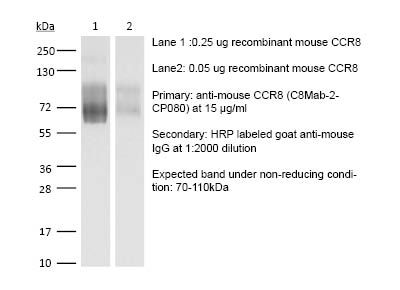Catalog #CP080
RecombiMAb anti-mouse CCR8
Clone
C8Mab-2-CP080
Reactivities
Mouse
Isotype
Mouse IgG2a, kappa
(switched from Rat IgG2b, kappa)
(switched from Rat IgG2b, kappa)
You may also be interested in:
Product Description
The C8Mab-2-CP080 monoclonal antibody is a recombinant, chimeric version of the original C8Mab-2 antibody. The variable domain sequences are identical but the constant region sequences have been switched from Rat IgG2b, κ to Mouse IgG2a, κ for use in murine models. Species-matched chimeric antibodies exhibit regulated effector functions—including Fc receptor binding and complement activation—and result in less immunogenicity and formation of anti-drug antibodies (ADAs) than xenogenic antibodies in animal models. The anti-tumor activity of anti-CCR8 antibodies has been demonstrated to require Fc-mediated effector function with studies confirming the superior mouse IgG2a antibody binding to mouse FcγRIII and mouse FcγRIV is crucial for NK cell-mediated ADCC and macrophage-mediated ADCP in mice. The highly controlled sequence and lack of genetic drift in recombinant antibodies also provides more reliable and reproducible results over hybridoma derived antibodies.
The C8Mab-2 monoclonal antibody recognizes the N-terminal region (1–33 amino acids) of mouse C-C chemokine receptor type 8 (CCR8), also known as CKR-8, CDw198, CMKBRL2, CMKBR8, and GPRCY6. CCR8 is a seven-pass transmembrane chemokine receptor and a member of the G protein-coupled receptor (GPCR) family. CCR8 ligands include CCL1, CCL16, and CCL8 (mCCL8) or CCL18 (hCCL18, a functional analog of mouse CCL8). Human and mouse CCR8 as well as its primary ligand CCL1 are structurally related, and this ligand is critical for skin homing of T cells and the survival of the regulatory T cells (Tregs) as well as their chemotaxis into tumors. CCR8 is predominantly expressed on activated Tregs marking the most suppressive and proliferative Treg population residing in the TME. Regulatory T cells (Tregs) are immunosuppressive cells essential for maintaining peripheral immune tolerance and preventing harmful autoimmune responses. A deficiency in their number or function can lead to the development of autoimmune disorders. Conversely, an abundance of Tregs, particularly a high Treg-to-CD8+ T effector cell ratio, can hinder anti-tumor immune surveillance and promote cancer progression. CCR8, a surface receptor selectively expressed on activated Tregs within tumors, has emerged as a promising therapeutic target. Its selective expression offers the potential to enhance anticancer responses while minimizing the safety risks associated with earlier systemic Treg-targeting strategies. Recent in-vivo studies have documented the involvement of CCR8 in type 2 inflammatory diseases, including atopic dermatitis (AD) and allergic enteritis (AE). In the tumor microenvironment, CCR8+ Treg numbers directly correlate with an advanced state of cancer, and therapeutic depletion of CCR8+ tumor-infiltrating Tregs (ti-Tregs) is shown to exert antitumor immunity and synergism with anti-PD-1 therapy.
The C8Mab-2 monoclonal antibody recognizes the N-terminal region (1–33 amino acids) of mouse C-C chemokine receptor type 8 (CCR8), also known as CKR-8, CDw198, CMKBRL2, CMKBR8, and GPRCY6. CCR8 is a seven-pass transmembrane chemokine receptor and a member of the G protein-coupled receptor (GPCR) family. CCR8 ligands include CCL1, CCL16, and CCL8 (mCCL8) or CCL18 (hCCL18, a functional analog of mouse CCL8). Human and mouse CCR8 as well as its primary ligand CCL1 are structurally related, and this ligand is critical for skin homing of T cells and the survival of the regulatory T cells (Tregs) as well as their chemotaxis into tumors. CCR8 is predominantly expressed on activated Tregs marking the most suppressive and proliferative Treg population residing in the TME. Regulatory T cells (Tregs) are immunosuppressive cells essential for maintaining peripheral immune tolerance and preventing harmful autoimmune responses. A deficiency in their number or function can lead to the development of autoimmune disorders. Conversely, an abundance of Tregs, particularly a high Treg-to-CD8+ T effector cell ratio, can hinder anti-tumor immune surveillance and promote cancer progression. CCR8, a surface receptor selectively expressed on activated Tregs within tumors, has emerged as a promising therapeutic target. Its selective expression offers the potential to enhance anticancer responses while minimizing the safety risks associated with earlier systemic Treg-targeting strategies. Recent in-vivo studies have documented the involvement of CCR8 in type 2 inflammatory diseases, including atopic dermatitis (AD) and allergic enteritis (AE). In the tumor microenvironment, CCR8+ Treg numbers directly correlate with an advanced state of cancer, and therapeutic depletion of CCR8+ tumor-infiltrating Tregs (ti-Tregs) is shown to exert antitumor immunity and synergism with anti-PD-1 therapy.
Specifications
| Isotype | Mouse IgG2a, κ |
|---|---|
| Recommended Isotype Control(s) | RecombiMAb mouse IgG2a isotype control, unknown specificity |
| Recommended Dilution Buffer | InVivoPure pH 7.0 Dilution Buffer |
| Conjugation | This product is unconjugated. Conjugation is available via our Antibody Conjugation Services. |
| Reported Applications |
Western blot *Flow Cytometry *Immunofluorescence *Reported for the original C8Mab-2 antibody. For information on in vivo applications, please contact technicalservice@bioxcell.com |
| Formulation |
PBS, pH 7.0 Contains no stabilizers or preservatives |
| Endotoxin |
≤0.5EU/mg (≤0.0005EU/μg) Determined by LAL assay |
| Purity |
≥95% Determined by SDS-PAGE |
| Sterility | 0.2 µm filtration |
| Production | Purified from mammalian cell supernatant in an animal-free facility |
| Purification | Protein G |
| Molecular Weight | 150 kDa |
| Murine Pathogen Tests |
Ectromelia/Mousepox Virus: Negative Hantavirus: Negative K Virus: Negative Lactate Dehydrogenase-Elevating Virus: Negative Lymphocytic Choriomeningitis virus: Negative Mouse Adenovirus: Negative Mouse Cytomegalovirus: Negative Mouse Hepatitis Virus: Negative Mouse Minute Virus: Negative Mouse Norovirus: Negative Mouse Parvovirus: Negative Mouse Rotavirus: Negative Mycoplasma Pulmonis: Negative Pneumonia Virus of Mice: Negative Polyoma Virus: Negative Reovirus Screen: Negative Sendai Virus: Negative Theiler’s Murine Encephalomyelitis: Negative |
| Storage | The antibody solution should be stored at the stock concentration at 4°C. Do not freeze. |
| Need a Custom Formulation? | See All Antibody Customization Options |

